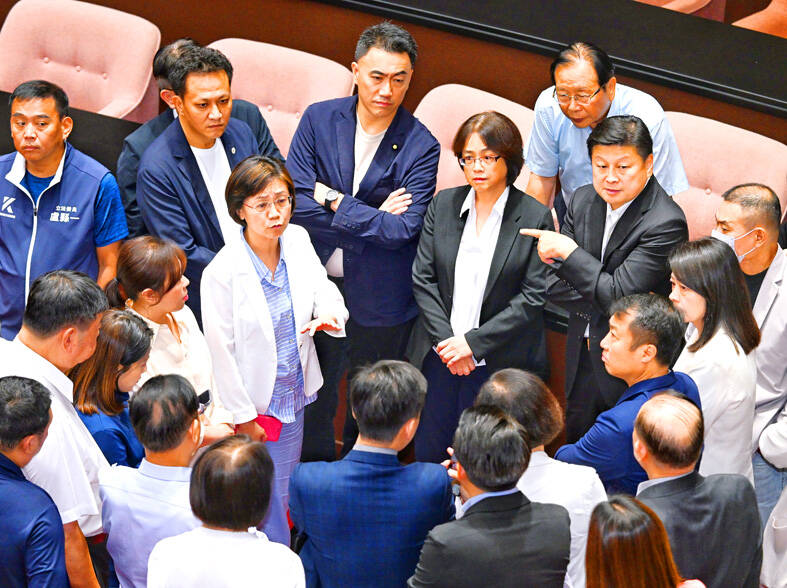Chinese Nationalist Party (KMT) legislators have agreed to reconsider proposed amendments to the Offshore Islands Development Act (離島建設條例), after criticism that it would open the door to Chinese infiltration and undermine national security.
The proposal was submitted earlier in the week by KMT legislators Chen Hsueh-sheng (陳雪生) and Chen Yu-jen (陳玉珍), who represent Lienchiang and Kinmen counties.
During a legislative interpellation session yesterday, Democratic Progressive Party (DPP) legislators requested to return the proposal to the Procedure Committee for further deliberation, and the motion was approved without objection from other parties.

Photo: Fang Pin-chao, Taipei Times
Taiwan People’s Party (TPP) caucus whip Huang Kuo-chang (黃國昌) told a news conference yesterday that his party would not support the proposal, as it would allow Chinese firms to tender for industrial development and public construction projects.
“We believe this has far-reaching consequences, and so the TPP would not support it. We do not agree to change the Offshore Islands Development Act this way, to specially open up a backdoor to address the economic and labor issues there. It is not a suitable way to solve these problems,” Huang said.
Meanwhile, there were also reports of disagreement within the KMT, with some party members reported as being lukewarm about the proposal and not wanting to endorse it, believing it is not the right time to introduce another highly contentious bill that could attract negative reactions from the public.
During the interpellation session, Premier Cho Jung-tai (卓榮泰) said the amendments would have an “impact on government projects for airports, harbors, bridges and other important public construction works.”
“It would impact our national security, and we need to also consider safety and quality of work issues on major public construction projects... So I sincerely ask all legislators to consider national security as the top priority when reviewing the legislation,” Cho said.
After objections to the motion, the proposal was returned to the Procedure Committee for reconsideration.
However, KMT caucus leaders said they would not rule out bringing it out of the committee to vote on in the coming months.
Speaking on behalf of fellow party members, DPP Legislator Hung Sun-han (洪申翰) said the amendments were KMT efforts to introduce China’s Belt and Road Initiative to Taiwan.
On Thursday, the Mainland Affairs Council said it “cannot agree with the proposed amendments,” citing national security risks.

The first global hotel Keys Selection by the Michelin Guide includes four hotels in Taiwan, Michelin announced yesterday. All four received the “Michelin One Key,” indicating guests are to experience a “very special stay” at any of the locations as the establishments are “a true gem with personality. Service always goes the extra mile, and the hotel provides much more than others in its price range.” Of the four hotels, three are located in Taipei and one in Taichung. In Taipei, the One Key accolades were awarded to the Capella Taipei, Kimpton Da An Taipei and Mandarin Oriental Taipei. Capella Taipei was described by

EVA Airways today confirmed the death of a flight attendant on Saturday upon their return to Taiwan and said an internal investigation has been launched, as criticism mounted over a social media post accusing the airline of failing to offer sufficient employee protections. According to the post, the flight attendant complained of feeling sick on board a flight, but was unable to take sick leave or access medical care. The crew member allegedly did not receive assistance from the chief purser, who failed to heed their requests for medical attention or call an ambulance once the flight landed, the post said. As sick

Minister of Economic Affairs Kung Ming-hsin (龔明鑫) yesterday said that private-sector refiners are willing to stop buying Russian naphtha should the EU ask them to, after a group of non-governmental organizations, including the Centre for Research on Energy and Clean Air (CREA), criticized the nation’s continued business with the country. While Taiwan joined the US and its Western allies in putting broad sanctions on Russia after it invaded Ukraine in 2022, it did not explicitly ban imports of naphtha, a major hard-currency earner for Russia. While state-owned firms stopped importing Russian oil in 2023, there is no restriction on private companies to

INDUSTRY: Beijing’s latest export measures go beyond targeting the US and would likely affect any country that uses Chinese rare earths or related tech, an academic said Taiwanese industries could face significant disruption from China’s newly tightened export controls on rare earth elements, as much of Taiwan’s supply indirectly depends on Chinese materials processed in Japan, a local expert said yesterday. Kristy Hsu (徐遵慈), director of the Taiwan ASEAN Studies Center at the Chung-Hua Institution for Economic Research, said that China’s latest export measures go far beyond targeting the US and would likely affect any country that uses Chinese rare earths or related technologies. With Japan and Southeast Asian countries among those expected to be hit, Taiwan could feel the impact through its reliance on Japanese-made semi-finished products and